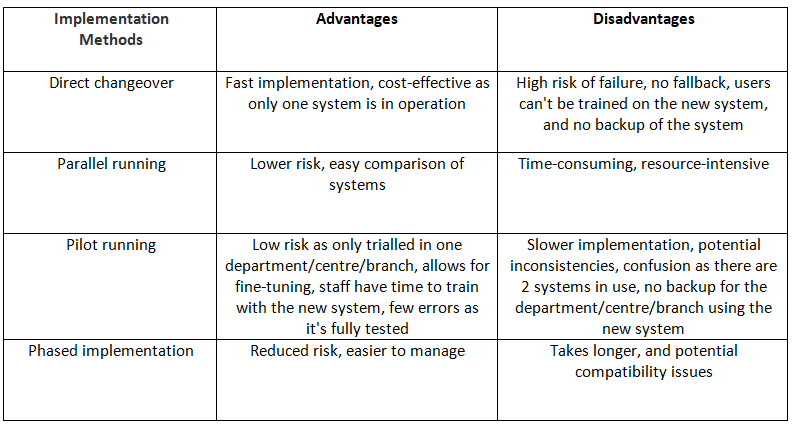Year 11 Exam > Year 11 Notes > IGCSE Information and Communication Technology Preparation > Systems Life Cycle: Implementation
Systems Life Cycle: Implementation | IGCSE Information and Communication Technology Preparation - Year 11 PDF Download
Direct Changeover
- The old system is immediately replaced by the new system.
- This method is used when quick implementation is essential.
Parallel Running
- Both the old and new systems operate simultaneously for a period before the old system is fully phased out.
- This approach is used to ensure a smooth transition with minimal risk.
Pilot Running
- The new system is deployed in a small, controlled environment before full-scale implementation.
- This strategy is used to test the new system in a real-world setting.
Phased Implementation
- The new system is introduced in stages, with each stage replacing a portion of the old system.
- This method is used to ensure a gradual transition, minimizing disruption.

Question for Systems Life Cycle: ImplementationTry yourself: Which method of system implementation is used to ensure a smooth transition with minimal risk?View Solution
The document Systems Life Cycle: Implementation | IGCSE Information and Communication Technology Preparation - Year 11 is a part of the Year 11 Course IGCSE Information and Communication Technology Preparation.
All you need of Year 11 at this link: Year 11
FAQs on Systems Life Cycle: Implementation - IGCSE Information and Communication Technology Preparation - Year 11
| 1. What are the different methods of implementing a system in the systems life cycle? |  |
Ans. The different methods of implementing a system in the systems life cycle include parallel run, direct changeover, and system implementation in stages.
| 2. What is parallel run in system implementation? |  |
Ans. Parallel run is a method of system implementation where the new system runs alongside the old system for a period of time to ensure that it is working correctly before fully transitioning to the new system.
| 3. What is direct changeover in system implementation? |  |
Ans. Direct changeover is a method of system implementation where the old system is completely replaced by the new system on a specific date, without running them simultaneously.
| 4. What is system implementation in stages? |  |
Ans. System implementation in stages is a method of implementing a system gradually, in phases, rather than all at once, allowing for easier transition and troubleshooting.
| 5. Which implementation method is most suitable for a large organization with complex systems? |  |
Ans. System implementation in stages is typically more suitable for a large organization with complex systems, as it allows for a smoother transition and reduces the risk of disruptions in operations.
|
91 docs|23 tests
|
Download as PDF

|
Explore Courses for Year 11 exam
|

|
Signup for Free!
Signup to see your scores go up within 7 days! Learn & Practice with 1000+ FREE Notes, Videos & Tests.
Related Searches
















